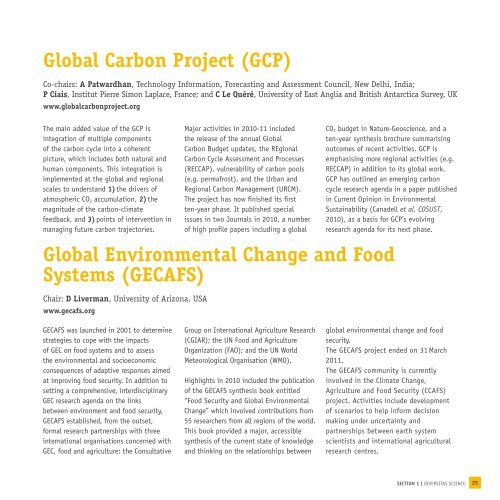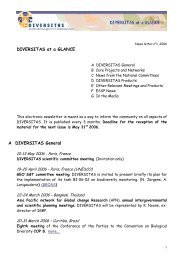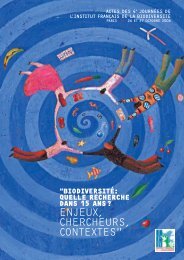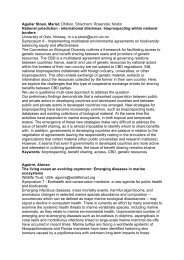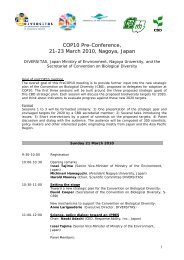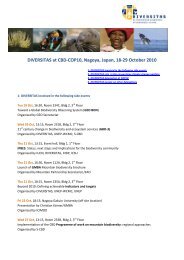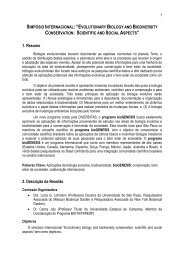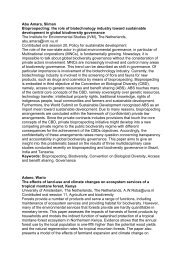Annual Report 2010-11 - Global Invasive Species Programme - GISP
Annual Report 2010-11 - Global Invasive Species Programme - GISP
Annual Report 2010-11 - Global Invasive Species Programme - GISP
You also want an ePaper? Increase the reach of your titles
YUMPU automatically turns print PDFs into web optimized ePapers that Google loves.
<strong>Global</strong> Carbon Project (GCP)Co-chairs: A Patwardhan, Technology Information, Forecasting and Assessment Council, New Delhi, India;P Ciais, Institut Pierre Simon Laplace, France; and C Le Quéré, University of East Anglia and British Antarctica Survey, UKwww.globalcarbonproject.orgThe main added value of the GCP isintegration of multiple componentsof the carbon cycle into a coherentpicture, which includes both natural andhuman components. This integration isimplemented at the global and regionalscales to understand 1) the drivers ofatmospheric CO 2 accumulation, 2) themagnitude of the carbon-climatefeedback, and 3) points of intervention inmanaging future carbon trajectories.Major activities in <strong>2010</strong>-<strong>11</strong> includedthe release of the annual <strong>Global</strong>Carbon Budget updates, the REgionalCarbon Cycle Assessment and Processes(RECCAP), vulnerability of carbon pools(e.g. permafrost), and the Urban andRegional Carbon Management (URCM).The project has now finished its firstten-year phase. It published specialissues in two Journals in <strong>2010</strong>, a numberof high profile papers including a globalCO 2 budget in Nature-Geoscience, and aten-year synthesis brochure summarisingoutcomes of recent activities. GCP isemphasising more regional activities (e.g.RECCAP) in addition to its global work.GCP has outlined an emerging carboncycle research agenda in a paper publishedin Current Opinion in EnvironmentalSustainability (Canadell et al, COSUST,<strong>2010</strong>), as a basis for GCP’s evolvingresearch agenda for its next phase.<strong>Global</strong> Environmental Change and FoodSystems (GECAFS)Chair: D Liverman, University of Arizona, USAwww.gecafs.orgGECAFS was launched in 2001 to determinestrategies to cope with the impactsof GEC on food systems and to assessthe environmental and socioeconomicconsequences of adaptive responses aimedat improving food security. In addition tosetting a comprehensive, interdisciplinaryGEC research agenda on the linksbetween environment and food security,GECAFS established, from the outset,formal research partnerships with threeinternational organisations concerned withGEC, food and agriculture: the ConsultativeGroup on International Agriculture Research(CGIAR); the UN Food and AgricultureOrganization (FAO); and the UN WorldMeteorological Organisation (WMO).Highlights in <strong>2010</strong> included the publicationof the GECAFS synthesis book entitled“Food Security and <strong>Global</strong> EnvironmentalChange” which involved contributions from55 researchers from all regions of the world.This book provided a major, accessiblesynthesis of the current state of knowledgeand thinking on the relationships betweenglobal environmental change and foodsecurity.The GECAFS project ended on 31 March20<strong>11</strong>.The GECAFS community is currentlyinvolved in the Climate Change,Agriculture and Food Security (CCAFS)project. Activities include developmentof scenarios to help inform decisionmaking under uncertainty andpartnerships between earth systemscientists and international agriculturalresearch centres.SECTION 1 I DIVERSITAS SCIENCE 25


